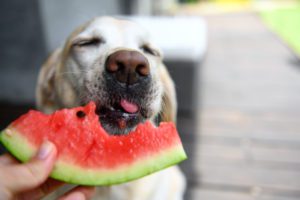What Fruits Can My Dog Eat?
What Fruits Can My Dog Eat?
There are six basic nutrients a dog needs in their diet: water, proteins, fats, carbohydrates, minerals, and vitamins. Dogs need all of these things to have a healthy and balanced diet. Most commercial diets are high-quality and nutritionally balanced; therefore, it is not necessary to give your dog additional foods such as fruit. However, it can be fun to give your dog fruits as a treat every now and then. Dogs enjoy delicious treats!
If your dog has any pre-existing conditions, check with your veterinarian before feeding your dog fruits or anything other than their regular dog food diet. It is also very important to understand which fruits are safe for your dog to eat, and which ones are not safe. Dogs digest food differently than humans, so eating the wrong foods can be dangerous.
Fruits That Are SAFE
Blueberries – Blueberries are safe for dogs to eat and they provide some health benefits as well. Blueberries are low in calories and high in vitamins, minerals, and antioxidants. The vitamins found in blueberries can boost your dog’s immune system, reduce inflammation, and improve the quality of their skin, coat, muscles, nerves, and bone density.
Strawberries – Strawberries are safe for dogs to eat and can also strengthen your dog’s immune system. Strawberries are full of fiber, vitamin C, potassium, and antioxidants. Since they do contain sugar, you should only give them to your dog in moderation. Strawberries also contain an enzyme that can help whiten your dog’s teeth!
Watermelon – Watermelon is safe for dogs to eat, but the rinds and the seeds should never be given to dogs. The seeds in watermelon can cause choking or intestinal blockage, so it is very important that all of the seeds are removed before you feed your dog this sweet treat. Watermelon is 92% water and can be a refreshing treat on a hot day. Not only will it help keep your dog hydrated, it is also a good source of vitamins and potassium.
Apples – Apples are safe for dogs to eat as long as you remove the core and the seeds first. Apples are a great source of vitamins A and C as well as fiber.
Bananas – Bananas are safe for dogs, but because of their high sugar content, they should only be given in moderation. Bananas are a good, low-calorie treat for dogs, and they are high in vitamins, potassium, biotin, fiber, and copper. The peel of a banana should not be given to dogs. It is difficult to digest and can cause intestinal blockage.
Cantaloupe – Cantaloupe is safe to feed dogs, but it is also very high in sugar so it should only be given in moderation. Cantaloupe has a lot of nutrients for dogs, it is low in calories, and it is a great source of water and fiber for dogs. However, this fruit may not be a good choice if your dog is overweight or has diabetes.
Cranberries – Cranberries and dried cranberries are safe for dogs to eat, but your dog may not like them because they are so tart. Cranberries are full of antioxidants and have many health benefits for dogs, but just like any other fruit, they should be given in moderation.
Pineapple – Pineapple is safe for dogs to eat and is a nice, sweet treat they may enjoy. Just make sure the outside peel is removed first. Pineapples are full of vitamins, minerals, and fiber. They also contain bromelain, which is an enzyme that makes it easier for dogs to absorb proteins.
Raspberries – In moderation, raspberries are safe for dogs to eat. They are low in sugar and calories, but high in antioxidants, fiber, manganese, and vitamin C. Raspberries are particularly good for older dogs because they have anti-inflammatory properties that can help a dog’s aging joints. However, raspberries do contain small amounts of xylitol which can be dangerous for dogs in higher amounts. If you are going to feed your dog raspberries, limit it to less than a cup of the berries at one time.

Fruits That Are NOT SAFE
Avocado – Avocado should not be given to dogs. While it may be a healthy snack for humans, it is dangerous to dogs. Avocados contain persin, which is a toxin that can cause vomiting and diarrhea in dogs.
Cherries – Cherries are not safe for dogs to eat. Cherry plants contain cyanide which is very toxic to dogs. If a dog ingests cyanide, their blood cells won’t be able to get enough oxygen. A high enough amount of cyanide can be extremely dangerous and potentially lethal for dogs. If your dog happens to get ahold of cherries, some symptoms of cyanide poisoning include dilated pupils, difficulty breathing, and red gums.
Grapes – Grapes and raisins (which are dried grapes) are extremely toxic for dogs and should never be given to them. Grapes can lead to acute sudden kidney failure in dogs. It is not known what the toxic substance is within grapes and raisins, but you should always avoid feeding them to your fur babies.
Tomatoes – You should avoid giving your dog tomatoes. The ripened fruit part of the tomato plant is typically considered safe for dogs to eat, but the green parts of tomato plants contain a toxic substance called solanine. Your dog would have to eat a large amount of the tomato plant to get sick, but it is better to be safe and skip tomatoes all together.

This is not a full list of fruits that are safe or unsafe for dogs to eat, but it is a good start. If you are unsure if something is safe for your dog, it is best to just not give it to them or check with your veterinarian. You never know how your dog’s stomach may handle certain foods. You should always start with small amounts of anything new you are feeding your dog. Every dog is different, and some fruits may affect dogs differently.
